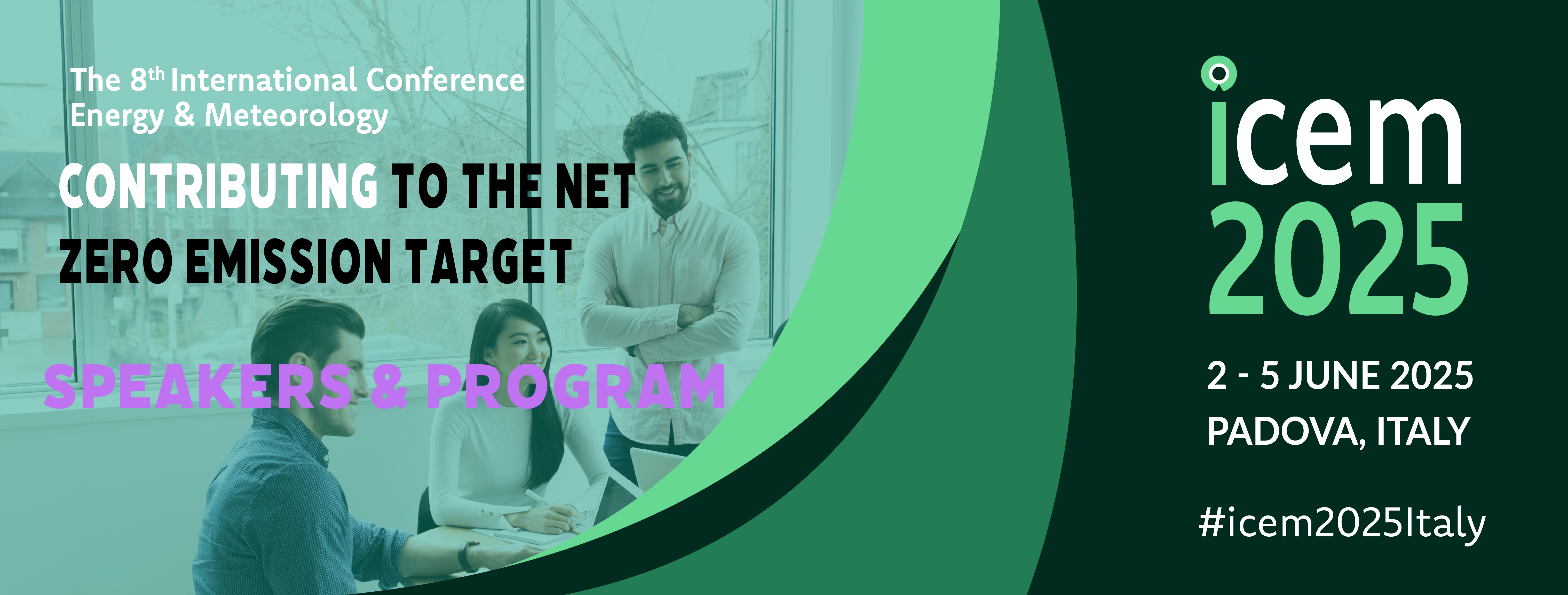The ICEM2025 team is still finalising the Speakers and Programme page, but we’re excited to share a sneak peek with you!
This year’s theme, Contributing to the Net Zero Emission Target, emphasises actionable strategies, innovative solutions, and impactful collaborations to address the most pressing challenges of our time—achieving net zero emissions and building resilient energy systems.
ICEM2025 features a dynamic program that bridges science, industry, and policy, offering a platform to tackle critical issues in energy and meteorology. Through thought-provoking sessions, interactive discussions, and networking opportunities, participants will gain valuable insights to drive transformative change within their organisations and beyond.
Here’s a snapshot of our workshops session program, designed to spark dialogue, inspire action, and foster meaningful connections:
Theme 1: Pathways to a Sustainable Energy Future
- Day 1 – Tuesday, 3 June 2025:
Net Zero: Explore diverse scenarios for achieving net zero emissions and transitioning to 100% renewable energy systems. Join leading experts in dissecting pathways to decarbonisation and practical solutions to accelerate this global shift. - Day 2 – Wednesday, 4 June 2025:
Resilience across timescales: Addressing climate change tipping points and managing the risks of extreme events. Engage in discussions about scenarios that foster resilience in the face of an uncertain climate future.
Theme 2: Driving Business Innovation and Collaboration
- Day 1 – Tuesday, 3 June 2025:
Business: Uncover the climate-related opportunities and challenges shaping the energy sector. From innovative business models to sustainable investment strategies, this session highlights the pivotal role of business in a net zero transition. - Day 2 – Wednesday, 4 June 2025:
Education, Collaboration, and Stakeholder Engagement: Explore strategies to strengthen partnerships, enhance knowledge sharing, and build the capacity to address energy and meteorology challenges through collective action.
Theme 3: Harnessing Data and Technology for Climate Solutions
- Day 1 – Tuesday, 3 June 2025:
Maximising Reanalysis Data Value for Energy Sector Use: Dive into the evolving landscape of data for energy systems. Topics include leveraging data for climate risk assessments, proxy sharing while ensuring confidentiality, and exploring new data market opportunities. - Day 2 – Wednesday, 4 June 2025:
AI/ML: Discover the transformative potential of artificial intelligence and machine learning in energy and climate solutions. From predictive analytics to optimisation tools, learn how these technologies are shaping the future of sustainable energy.
We can’t wait to welcome you to ICEM2025, where ideas take flight, partnerships form, and solutions come to life. Stay tuned for more details, and secure your spot today!
Invited Speakers
-
Sue Ellen Haupt Senior Scientist and Deputy Director at National Center for Atmospheric Research (NCAR); Non-Exec. Director, WEMC
-
-
-
-
Program
The provisional programme for the ICEM2025 is available here.
Scientific & Programme Organising Committee
The organisation of ICEM 2025 wouldn’t be possible without the expertise of our integral science and programme organising committee, made up of global experts in the field:
- Dr Stefano Alessandrini (NCAR, USA)
- Dr Juan Antonio Añel (CIM, Universidade de Vigo, Spain)
- Dr Pierre Audinet (World Bank, USA)
- Dr Jake Badger (DTU Wind, Denmark)
- Dr Susana Bayo (Energy Systems Centre of INESC TEC, Portugal)
- Dr Hamid Bastani (WMO)
- Dr Hannah Bloomfield (University of Bristol, UK)
- Ms Roberta Boscolo (WMO)
- Dr David Brayshaw (University of Reading, UK)
- Mr Christian Brose (Uniper Global Commodities SE, Germany)
- Dr Carlo Buontempo (ECMWF, UK)
- Mr Simon Camal (MinesParisTech, France)
- Dr Steve Dorling (UEA/WeatherQuest, UK)
- Dr Laurent Dubus (RTE/WEMC, France)
- Prof. John Dutton (Prescient Weather Ltd, USA)
- Dr. Jan Dutton (Prescient Weather Ltd, USA)
- Mr James Fallon (University of Reading, UK)
- Dr Gregor Giebel (DTU, Denmark)
- Dr Prashant Goswami (CSIR, India)
- Dr Don Gunasekera (Deakin Universiy, Australia)
- Prof Gareth Harrison (The University of Edinburgh, UK)
- Dr Alain Heimo (ex-Meteotest, Switzerland)
- Dr Sue Ellen Haupt (NCAR/WEMC, USA)
- Dr Detlev Heinemann (Oldenburg University, Germany)
- Dr Tao Hong (University of North Carolina, USA)
- Mr Carsten Hoyer-Klick (DLR, Germany)
- Dr Georges Kariniotakis (MINES ParisTech, France)
- Mr. Ben Hutchins (University of Reading, UK)
- Mr Trevor Lee (Energy Partners, Australia)
- Dr Jared Lee (NCAR, USA)
- Dr Pascal Mailier (Royal Meteorological Institute, Belgium)
- Dr Rochelle Schneider Dos Santos (European Space Agency, Italy)
- Mr Karthik Mukkavilli (UNSW & CSIRO, Australia)
- Dr Marisol Osman (KIT, Germany)
- Mr Pierre Pinson (Imperial College, UK)
- Dr David Pozo Vázquez (University of Jaén, Spain)
- Dr David Renné (ISES, USA)
- Mr Mohammed Sadeck (ClimDevAfrica)
- Mr Yves-Marie Saint-Drenan (Mines Paris Tech, France)
- Prof Roberto Schaeffer (Federal University of Rio de Janeiro, Brazil)
- Dr Marion Schroedter-Homscheidt (DLR, Germany)
- Dr Justin Sharp (Sharply Focused, USA)
- Dr Manajit Sengupta (NREL, Colorado, USA)
- Mr Wes Stein (CSIRO, Australia)
- Mr Jess Torpey (Uniper, Germany)
- Dr Alberto Troccoli (WEMC/ICS, UK/Italy, Chair and ICEM 2025 Convener)
- Dr James Wilczak (NOAA, USA)
- Dr Jan Wohland (ETH, Switzerland)
- Mr Matthew Wright (Royal Meteorological Society and University of Oxford, UK)
- Dr Rong Zhu (China Meteorological Administration)
- Dr Ziniu Xiao (State Key Laboratory of Numerical Modeling for Atmospheric Sciences and Geophysical Fluid Dynamics, LASG), Institute of Atmospheric Physics (IAP), Chinese Academy of Sciences (CAS)



